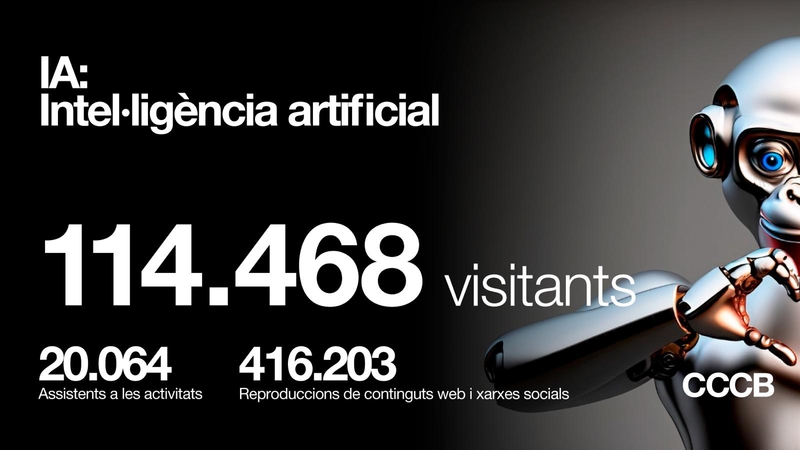The exhibition has attracted 114,468 visitors since it opened last October. A success only surpassed by an exhibition on the film director Stanley Kubrick in the 30-year history of the Centre de Cultura Contemporània de Barcelona
Since its opening last October, the exhibition "AI: Artificial Intelligence", co-produced by the Centre de Cultura Contemporània de Barcelona (CCCB) and the Barcelona Supercomputing Center - Centro Nacional de Supercomputación (BSC-CNS), based on an original exhibition curated and organised by the Barbican Centre in London (2019), has attracted 114,468 visitors. Also noteworthy is the attendance of 20,064 people at the other activities linked to the exhibition and the 416,203 views on social networks and web content related to the exhibition.
So far, since the CCCB opened in 1994, the three most visited exhibitions have been "Stanley Kubrick" (2018-2019) with 146,667 visitors, "The Century of Cinema" (1995-1996) with 113,529 and "More Human. The future of our species" (2015-2016) with 112,439. "AI: artificial intelligence", which has the scientific advice of BSC researcher Jordi Torres, is now in a second historical position.
The exhibition, which closed its doors last Sunday, addresses the role of artificial intelligence in everyday life, the opportunities it presents for scientific and biomedical research, the role of supercomputing as the main driver, the current legislative situation, the risks of misinformation posed by its widespread use and the racial and gender biases it can produce.
The exhibition included a large audiovisual installation created by the BSC, 'Billions of operations per second', which shows, through the vision of BSC researchers Fernando Cucchietti, Amanda Duarte, Victor Guallar, Oriol Jorba, Marta Melé, Alfonso Valencia and Marta Villegas, The event also showed how supercomputing and AI are enabling progress in the resolution of complex problems such as the construction of healthier, more sustainable cities adapted to climate change, the discovery of new drugs and the promotion of research into diseases such as cancer or the identification of new generation materials.
There was also an exhaustive interactive timeline with the key goals of the development and evolution of artificial intelligence, with the advice of BSC researcher and UPC professor Ulises Cortés and BSC researcher Darío García.


